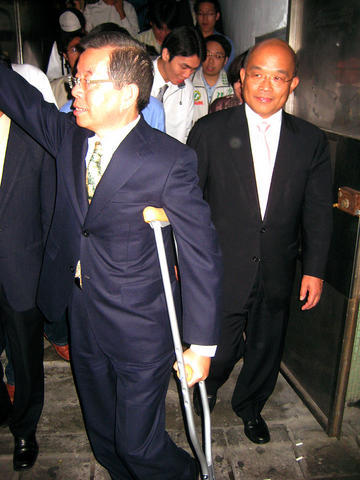President Chen Shui-bian (
Chen made the remarks at a press conference on the Marshall Islands, where he was attending a summit with leaders of the nation's six diplomatic allies in the Pacific.
"The tavern must be closed when the time comes," he said. "I will not only hand over the presidency but also the party chairmanship to president Hsieh. There is no doubt about it."

PHOTO: CNA
Chen, who announced his decision to accept the party chairmanship on Thursday, said yesterday he would not lead the government with the party's policy goals.
Echoing former president Lee Teng-hui's (李登輝) comment that former presidents should not meddle in the affairs of the sitting president, Chen said he would not criticize Hsieh or tell him what to do after he leaves office. He added that he would exercise a sense of propriety and do what he said.
His second job is simple, he said, which is to unite the party, lead it in winning next year's legislative and presidential elections, and push for passage of the party's UN referendum proposal.
Chen said that next year's presidential election was different from the polls in 2000 and 2004 when the party had to contend with outside competition.
"Near year's election is a completely different ball game," Chen said. "The enemy lies within."
Chen said that the repercussions of the party's fierce presidential primary had caused a yawning chasm within the party, and the fracture must be mended or it would have a hard time winning.
It was a pity the party wasted much time over the past few months on idle spin, he said.
Chen called former DPP chairman Yu Shyi-kun irreplaceable, adding that it would be a pity if Yu did not participate in the election campaign. He promised to recruit talented people to the party, including his new special assistant who is Yu's former adviser.
Commenting on the DPP's referendum proposal of seeking UN membership under the name "Taiwan," Chen said that no force could stop the rising trend of Taiwan-centered consciousness, adding that this was critical to winning next year.
He said that pushing the referendum was a joint consensus with Hsieh, dismissing speculation that Hsieh was forced to bow to the president's will.
Chen said it was impossible for the two to be divided over the issue because it concerns national interest and Taiwan's sovereignty.
Emphasizing that Taiwan and China are two different nations, Chen said that using the name "Taiwan" to apply for UN membership is a good way to remove the stumbling block of "one China."
The administration should have done it a long time ago, he said.

Chinese Nationalist Party (KMT) Chairman Eric Chu (朱立倫), spokeswoman Yang Chih-yu (楊智伃) and Legislator Hsieh Lung-chieh (謝龍介) would be summoned by police for questioning for leading an illegal assembly on Thursday evening last week, Minister of the Interior Liu Shyh-fang (劉世芳) said today. The three KMT officials led an assembly outside the Taipei City Prosecutors’ Office, a restricted area where public assembly is not allowed, protesting the questioning of several KMT staff and searches of KMT headquarters and offices in a recall petition forgery case. Chu, Yang and Hsieh are all suspected of contravening the Assembly and Parade Act (集會遊行法) by holding

PRAISE: Japanese visitor Takashi Kubota said the Taiwanese temple architecture images showcased in the AI Art Gallery were the most impressive displays he saw Taiwan does not have an official pavilion at the World Expo in Osaka, Japan, because of its diplomatic predicament, but the government-backed Tech World pavilion is drawing interest with its unique recreations of works by Taiwanese artists. The pavilion features an artificial intelligence (AI)-based art gallery showcasing works of famous Taiwanese artists from the Japanese colonial period using innovative technologies. Among its main simulated displays are Eastern gouache paintings by Chen Chin (陳進), Lin Yu-shan (林玉山) and Kuo Hsueh-hu (郭雪湖), who were the three young Taiwanese painters selected for the East Asian Painting exhibition in 1927. Gouache is a water-based

Taiwan would welcome the return of Honduras as a diplomatic ally if its next president decides to make such a move, Minister of Foreign Affairs Lin Chia-lung (林佳龍) said yesterday. “Of course, we would welcome Honduras if they want to restore diplomatic ties with Taiwan after their elections,” Lin said at a meeting of the legislature’s Foreign Affairs and National Defense Committee, when asked to comment on statements made by two of the three Honduran presidential candidates during the presidential campaign in the Central American country. Taiwan is paying close attention to the region as a whole in the wake of a

OFF-TARGET: More than 30,000 participants were expected to take part in the Games next month, but only 6,550 foreign and 19,400 Taiwanese athletes have registered Taipei city councilors yesterday blasted the organizers of next month’s World Masters Games over sudden timetable and venue changes, which they said have caused thousands of participants to back out of the international sporting event, among other organizational issues. They also cited visa delays and political interference by China as reasons many foreign athletes are requesting refunds for the event, to be held from May 17 to 30. Jointly organized by the Taipei and New Taipei City governments, the games have been rocked by numerous controversies since preparations began in 2020. Taipei City Councilor Lin Yen-feng (林延鳳) said yesterday that new measures by